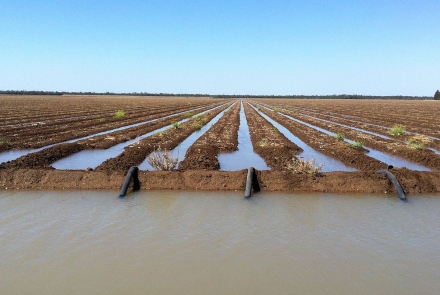
Photo by Hullwarren on Wikimedia Commons
Is it time to empower irrigation’s critics?
Any major attempt at restoring the Murray-Darling Basin depends on the strength of support it has in the community, not just among policymakers, Daniel Connell writes.
The Murray-Darling Basin Plan (MDBP) is in serious trouble, with the date for its implementation receding rapidly. The original timetable committed all governments to implementing their regional water resource plans by mid-2019. Now, in mid-2020, most of the New South Wales plans have still not been assessed and its government is demanding that the other states agree to indefinite delay.
Opposition to the MDBP is not just coming from the state government. In southern New South Wales, there is strong community resentment in response to yet another year with low water allocations.
Over-allocation and climate change have been rejected as explanations by some even though inflows in the past 20 years are down 50 per cent compared to the preceding century. Instead, regional irrigators are demanding the suspension of the MDBP.
Introduced with high hopes by the national government in 2012, the MDBP was designed to implement sustainable water management. Among other things that included greater recognition of the importance of the riverine environment.
Now the Plan attracts little support from either irrigators or environmentalists. The former resent its restrictions, but the latter see few environmental benefits.
In its current form, the MDBP is a technocratic top-down program imposed with minimal community support.
Worldwide, such programs have long proved vulnerable to policy re-capture by irrigation interests waiting to regain control when the wider public enthusiasm for reform recedes. This is exactly what has happened in the Murray-Darling Basin.
The MDBP lost credibility after it failed to achieve early progress towards objectives that the public understood. During the recent drought, which still lingers, there were heart-rending accounts of stressed irrigation in communities, but few stories proclaiming the benefits of sustainable river management. Instead, there was extensive media coverage of mass fish kills and lurid water market corruption scandals, particularly in New South Wales.
Since the reforms and optimism of the 1980s there have been a number of attempts to reverse long term environmental decline in the Basin. The most recent is the MDBP approved by the national parliament with near unanimous support. The current Deputy Prime Minister and leader of the farmer-based National Party, Michael McCormack, was among its few opponents, and now it too is failing.
What is to be done? Part of the solution to the loss of public support for the MDBP and the wider crisis facing rural communities in the Basin, could come not from retreat, but from more determined support for water reform, albeit with a different approach to implementation.
To succeed where its predecessors have failed, the next iteration of water reform must attract stronger support in the regional river towns where irrigation interests currently dominate. Concern for the wide ranging social and economic impacts of environmental decline is not currently reflected in the public debate about the MDBP, and strategic thinking is needed to change that situation.
Despite their reputation, these communities are socially diverse with significant economic interests in other industries, such as tourism. They also contain a substantial number of retirees. Both as a tourist attraction and as a symbol of the community, it is important that the river is physically attractive, not just a water delivery system.
As they know from experience, property values and the number and variety of regional commercial and government services are affected by population size, something highly linked to environmental outcomes in these communities.
At no time since 1988 – when all six governments with responsibilities in the catchment signed up to the Murray-Darling Basin Initiative – has there been a serious effort to explain the recurring pattern of policy failure to restore riverine environments.
One likely cause is that implementation has repeatedly been via a top-down approach. Supporters of the MDBP – there still are a few – will argue that there was considerable consultation before it was finalised. However, that consultation was highly controlled, and reflected the long-standing distrust of politically assertive communities that is pervasive in national political culture.
In Australia, community ‘representatives’ are usually selected by governments to serve at the pleasure of ministers. But to gain real public support for the implementation of controversial policies such as increased water for the environment, decision-making needs to be responsive to community representatives that are elected.
This would also mean they are more able to organise enthusiasm for policies and programs that are developed locally. To do that, they must be able to operate independently from the national and state governments.
The Murray-Darling Basin’s regional cities and towns would attract more new people if there was greater local control over environmental water.
Management of such water would create interesting jobs and real opportunities to involve local citizen scientists, and research projects in schools, for example, could be linked directly to regional rehabilitation programs.
The historical record indicates that the fate of any major attempt at river rehabilitation in the Murray-Darling Basin depends on the strength or weakness of regional community support, and this is where previous attempts at reform in the Basin have failed.
It is time for a new approach that empowers a wider range of social interests within river communities, and sees the Basin not simply as water, but as the heart of a diverse and important region and at both the economic and social centre of these regional communities.
Updated: 25 September 2024/Responsible Officer: Crawford Engagement/Page Contact: CAP Web Team













